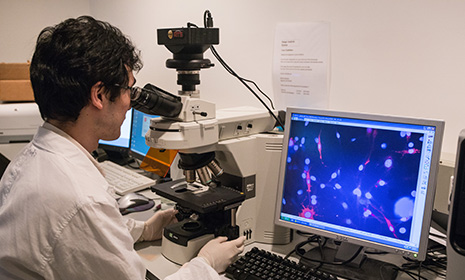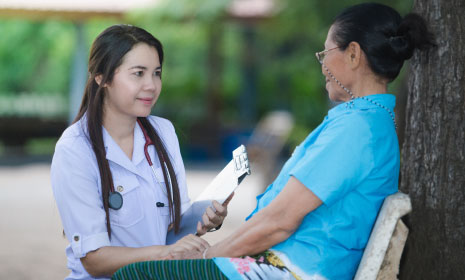Research Interests
Influenza and other infections of public health significance
Researchers
|
Professor Ali, Sheikh Taslim |
Infectious disease epidemiology, transmission dynamics, and outbreak control |
|
|---|---|---|
| Professor Bruzzone, Roberto |
Cell biology of host-pathogen interactions |
|
| Professor Chan, Chi Wai Michael |
Virus-host interaction and pathogenesis |
|
| Professor Cowling, Benjamin John |
Epidemiology and transmission dynamics |
|
| Professor Dhanasekaran, Vijaykrishna | Ecology, evolution, epidemiology and microbial genomics
|
|
| Professor Grépin, Karen | Policy response to control infectious disease outbreaks | |
| Professor Guan, Yi |
Ecology, evolution, transmission and pathogenesis |
|
| Professor Hui, Pui Yan Kenrie |
Risk assessment, pathogenesis and novel therapeutics |
|
| Professor Ip, Kai Ming Dennis |
Epidemiology, surveillance, and control of infectious diseases |
|
| Professor Lam, Tsan Yuk Tommy |
Ecology, evolution, epidemiology and bioinformatics |
|
| Professor Leung, Hiu Lan Nancy |
Epidemiology, respiratory virus transmission and immune responses, community-based longitudinal cohorts and vaccine trials |
|
| Professor Leung, Sze Man Kathy | Infectious disease epidemiology, modeling, and health economics | |
| Professor Peiris, Joseph Sriyal Malik |
Influenza virus, MERS coronavirus, pathogenesis, transmission, ecology sero epidemiology and control |
|
| Professor Poon, Lit Man Leo |
Virology, pathogenesis and diagnostics |
|
|
Professor Quan, Jianchao |
Health policy, economics and health care services |
|
|
Professor Tsang, Kam Lun Tim |
Biostatistics, infectious disease epidemiology and modeling |
|
|
Professor Wong, Sook San |
Population immunity and humoral immunity to respiratory viruses |
|
| Professor Wu, Peng |
Infectious disease epidemiology and AMR |
|
|
Professor Wu, Tsz Kei Joseph |
Epidemiology, modelling and transmission dynamics |
|
| Professor Yen, Hui Ling |
Pathogenesis and transmission |
|
| Professor Zanin, Mark |
Influenza pathogenesis, transmission and novel therapeutics |
|
| Professor Zhu, Huachen Maria |
Ecology, evolution, pathogenesis and transmission |
|
Hong Kong, a densely populated city, is an epicentre for emerging infectious diseases. The city provides an ideal location to study the ecology, transmission and public health interventions of emerging viral pathogens, such as the Middle East respiratory syndrome (MERS) coronavirus, Severe Acute Respiratory Syndrome Coronavirus 2 (SARS-CoV-2) and zoonotic viruses with pandemic potential such as the avian and swine influenza viruses. Our integrated multidisciplinary research programme includes internationally recognised expertise supported by the best laboratory and field resources, in Hong Kong and southern China, with a network of excellent international collaborations. Our research programme has eight foci:
- Ecology, evolution and the origin of pandemic and zoonotic influenza, coronaviruses and other important emerging viruses
- Explore ecological factors favouring interspecies transmission and the drivers of the emergence of pandemic influenza and other viruses
- Conduct animal influenza (e.g. H5N1 and H7N9) and other emerging virus surveillance to understand virus evolution and zoonotic events
- Integrate viral genetic information with viral functionality to identify critical molecular signatures to facilitate identification of field isolates
- Take advantage of the city environment and the encompassing urban and rural landscape of southern China
- Efficient public health interventions for the control of influenza, coronaviruses and other emerging viruses
- Transmission control within communities
- Interventions to control viral disease epidemics
- Epidemiology and control of influenza viruses and coronaviruses
- Novel “universal” vaccine strategies for influenza
- Development and spread of antimicrobial resistance
- Monitor antimicrobial resistance (AMR) bacteria using One Health approach
- Monitor antimicrobial resistance (AMR) bacteria using One Health approach
- Influenza, coronaviruses and other emerging virus pathogenesis
- Viral and host factors related to virus pathogenesis, replication and virus-host interactions
- Viral tropism
- Innate and adaptive host immune responses
- Viral determinants of interspecies transmissions
- Acute lung injury and novel therapeutic options
- Modes of respiratory transmission and transmission dynamics
- Large community-based studies of aerosol transmission
- Experimental transmission using animal models
- Aero-biological studies on airborne particles and virus viability
- Contact tracing within different population subgroups
- Seroepidemiological studies to parameterise mathematical models of virus transmission dynamics
- Infectious disease modelling
- Infectious disease modeling entails developing mathematical models to assimilate various streams of clinical, virologic, demographic, mobility, social and economic data to inform epidemic preparedness, nowcasting, forecasting and response
- Genomic epidemiology and evolution for public health
- Track pathogen transmission over spatial scales, from local outbreaks to global pandemics
- Combine genomic data with individual-level metadata to identify demographic factors driving transmission patterns
- Integrate emerging data sources (such as wastewater surveillance) with population genetics and molecular evolution
- Apply phylodynamics – the combination of epidemiology, evolution, and immunodynamics – to address key questions regarding epidemic preparedness and control
- Changing dynamics of epidemic and endemic viruses under COVID-19 control strategies
- Individual and population immunity
- Community-based longitudinal cohort studies and vaccine trials on influenza and COVID-19 vaccination and infections
- Vaccine reactogenicity and immunogenicity
- Correlates of protection against infection and severe disease
- Individual heterogeneity in immune responses
- Impact of individual and population immunity on herd immunity, transmission dynamics and epidemic size
- Alternative vaccination strategies
Non-communicable diseases in global health
Researchers
| Professor Au Yeung, Shiu Lun Ryan |
Lifestyle and lifecourse epidemiology, and Mendelian randomization |
|
|---|---|---|
| Professor Bishai, David Makram |
Health economics, public health systems, primary health care |
|
| Professor Grépin, Karen |
Health services research, comparative health systems and health financing |
|
| Professor Ho, Sai Yin Daniel |
Adolescent health |
|
| Professor Kim, Youngwon |
Physical activity epidemiology and measurement |
|
| Professor Lam, Wing Tak Wendy |
Behavioural health and psycho-oncology |
|
| Professor Leung, Sze Man Kathy |
Cancer epidemiology, cancer screening, health economics |
|
| Professor Liao, Qiuyan Julie |
Risk communication, public risk perception and behavioural decision-making |
|
| Professor Montero, David |
Integrative physiology and impact of lifestyle interventions |
|
| Professor Ni, Yuxuan Michael |
Lifestyle and lifecourse epidemiology and psychiatric epidemiology |
|
| Professor Quan, Jianchao |
Health policy, economics and health care services |
|
| Professor Siu, Ming Fai Parco |
Exercise physiology and muscle biology |
|
| Professor Tian, Linwei |
Environmental epidemiology |
|
| Professor Wu, Tsz Kei Joseph |
Cancer epidemiology, cancer screening, health economics |
|
| Professor Zhao, Jie Jane |
Lifestyle and lifecourse epidemiology and intervention |
|
South East Asia, and Hong Kong specifically, provides a contextually specific setting from which to gain a better understanding of non-communicable chronic diseases in global health. Disease patterns in Hong Kong challenge prevailing wisdom about traditional cardiovascular and diabetes disease risk factors. As the most developed, westernized and over-crowded city of China, Hong Kong provides golden opportunities for trials of preventive interventions on both communicable and non-communicable diseases. Hong Kong is a sentinel for China and other South East Asian populations currently experiencing rapid economic development and globalisation. Our research programme has fourteen foci:
- Advanced epidemiology and statistical research methods
- Applied to four active cohorts spanning the life course to confirm or refute empirically driven hypotheses in a unique setting
- Emphasising innovative theoretical methods and models for population health (Mendelian randomisation, instrumental variable analysis, mathematical modelling of health services utilisation, neural networks, partial least squares, latent growth modelling and clinical decision analysis)
- Causes of and interventions for non-communicable diseases prevention and treatment
- Childhood experiences, growth patterns, and body composition
- Family dynamics and lifestyle choices
- Air pollution and climate change
- The microbiome
- Social disparities
- Smoking, alcohol, healthy living, and aging
- Population mental health
- Cross-national and global mental health
- Psychobehavioural responses to population events
- Promotion of mental wellbeing and the prevention of mental health disorders
- Inter- and intra-generational effects on health
- Evaluation of population level screening policies
- Cost effectiveness of cancer screening programmes
- Cost effectiveness of vaccine programmes
- Identification of new interventions to prevent non-communicable diseases
- The role of hormones
- Population risk perception
- Health behaviour change and simple interventions
- Socio-economic patterning of non-communicable diseases in South East Asian populations
- Drivers of long-term trends
- Application of evolutionary biology to inform public health interventions
- Non-communicable disease impact on local and regional health service utilisation and health policy
- Economic costs of service provision
- Role of manpower planning and inter-professional work in service delivery models
- Financial models for healthcare service delivery and their impact on health in Hong Kong and in China
- Political-economic, social and personal factors
- Physical activity and health
- Exercise physiology and health sciences
- Physiological responses to high-intensity exercise and physical inactivity
- Health benefits and the underlying mechanisms of mind-body exercise
- Physical activity epidemiology and measurement
- Role of physical activity in modifying the genetic risk of chronic diseases
- Use of wearables and genomic technologies in promoting physical activity
- Physical activity and exercise in children
- Physiological determinants of cardiorespiratory fitness
- Exercise physiology and health sciences
- Skill learning and expert performance
- Motor learning and performance
- Perception and performance in expert and novice populations
- Movement rehabilitation
- Motor learning and performance
- Psycho-oncology
- The contribution of cognitive bias to psychological distress in clinical population
- The role of negative meta-cognitive beliefs, intolerance of uncertainty and interoceptive attention in fear of cancer recurrence
- Cancer survivorship and fear of cancer recurrence
- Doctor-patient communication and decision-making
- Symptom burden and its impact of cancer rehabilitation
- Research on the implementation of psychosocial and behavioural interventions in cancer care
- Bioinformatics and cancer biostatistics
- Big data analytics
- Biomarker discovery
- Machine learning
- Public health genetics and genomics
- Risk communication, risk perception and public health
- Vaccine confidence
- Vaccine confidence
- Approaches to health care delivery for patients with chronic illnesses








.png)
